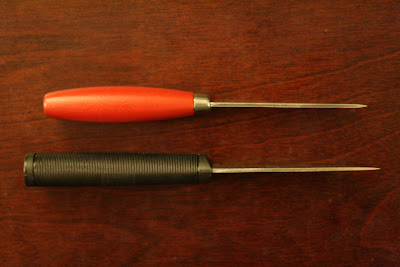
Specifications:
Knife Length: 8 1/2 inches (217 mm)
Blade Length: 4 inches (102 mm)
Blade Thickness: 3/32 inches (2.4 mm)
Blade Width: 15/16 inches (24 mm)
Blade Material: 4116 Krupp stainless steel
Blade Hardness: HRC 56-57 on the Rockwell Scale
Type of Tang: Partial concealed
Blade Grind: Hollow ground with a secondary bevel
Handle Material: Plastic
Sheath Material: Cordura
Cost: $10.00

The Finn Bear has a blade with a shape that closely resembles a puukko, and is similar in style to the Mora 1 and Clipper. In length it is similar to the Mora 1, and also has no finger guard. The blade comes almost all the way to the handle. The blade thickness is the same as the Mora 1, but it is wider, more closely resembling the Clipper. The similarities however, do not extend to the grind of the blade. The Mora 1 has a single bevel/Scandinavian grind, while the Finn Bear has a hollow ground blade with a secondary bevel. Because of the hollow ground blade however, the angle of the secondary grind is nearly the same as the single grind of the Mora 1.


The spine of the blade is rounded off, just like it was on the Mora 1. If you want to use it for striking sparks from a ferrocerium rod, you will have to square it off with a sharpening stone or a file. After that it will throw sparks just fine.
The handle is made out of some type of plastic. It has a very unusual shape. As you can see from the picture, it is tier shaped. This makes it comfortable at certain angles, but not at others. I wouldn’t say it’s bad, but I am not sure why that design was chosen. I much prefer the rounded handle of the Mora 1.

The knife came sharp, but not as sharp as I wanted. I had to spend about ten minutes with a sharpening stone to get it shaving sharp. When that was done, I took it out for testing.
I used the Finn Bear to split a 2-inch log. There was no problem. It performed in a similar way to the Mora 1. I could not detect any difference.

I also used a truncating technique to beat the blade into a log.

After that, it was still capable of making fuzz sticks. There is a common misconception about how a single bevel grind is the best for carving or making feather sticks. It is simply not true. Any sharp blade with a thin edge will get the job done. The grind that will do it the best is the one that you have been using the longest.

As this is not a full tang knife, I did not try to baton the tip of the blade into a piece of wood by hitting the back of the handle. Doing that can cause damage to the connection between the blade and the knife.
The tang goes only about half way into the handle. The tang is a bit shorter than that of the Mora 1, but it is longer than that of the Mora Clipper. (picture not taken by me)

The sheath of the Finn Bear is quite good. It is not complex, there is no quick belt attachment, but it does holds the knife securely. It is much better than the Mora 1 sheath.
From my use, the Cold Steel Finn Bear is a perfectly good knife, and I can not point to any performance deficiencies when compared to the Mora 1, other than the handle. I have seen only one other comparison between the two knives, and there the Finn Bear was used without being sharpened. Once I sharpened mine, the performance was very good. I am not sure whether or not it will get dull faster than the Mora 1, but during the time I used it, it did not lose any sharpness.
In design, it is a bit different than the Mora 1, but it does fulfill the same role. The two knives are the same price, and they offer comparable performance. The Finn Bear is a tough little knife and will be a good complement to an axe. Just like with the Mora 1, any heavy use will push the knife close to its limits, but for normal use, it will be perfectly adequate.